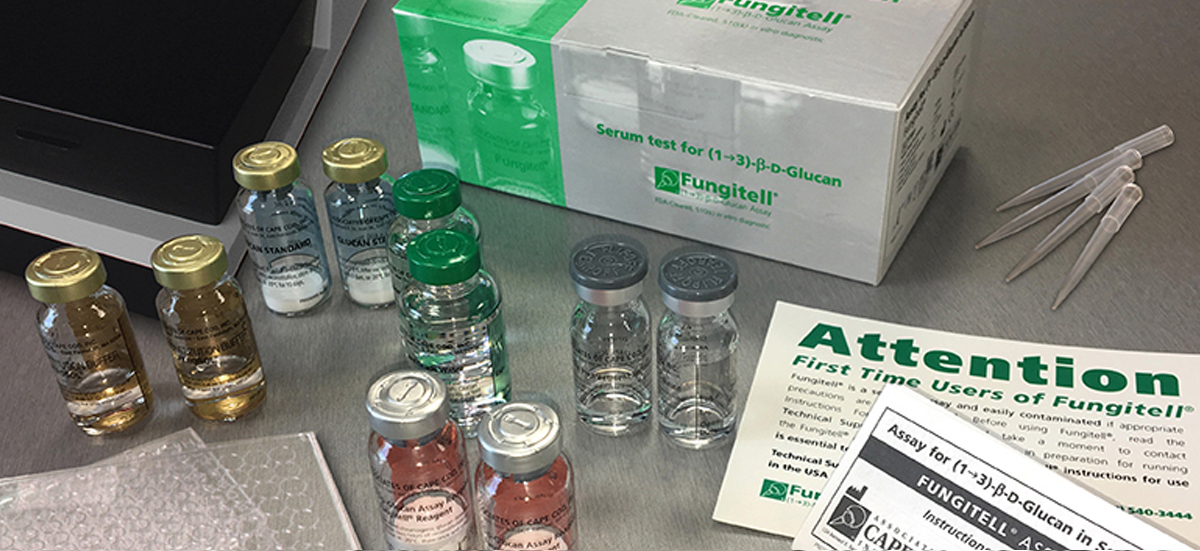Fungitell® Assay Testing
A rapid diagnostic test that detects (1→3)-β-glucan in serum.
About Fungitell® Assay
The Fungitell® assay is an FDA cleared, highly sensitive, rapid diagnostic test that detects (1→3)-β-D-glucan in serum in as little as one hour. (1→3)-β-D-glucan is a cell wall constituent of most medically important fungi including Candida and Aspergillus.* The assay is based upon a modification of the Limulus Amebocyte Lysate (LAL) pathway. The Fungitell reagent is modified to eliminate Factor C, and is therefore specific for (1→3)-β-D-glucan and does not react to other polysaccharides, including beta-glucans with different glycosidic linkages.The ability of the Fungitell assay's to detect picogram levels of (1→3)-β-D-glucan in serum assists clinicians in identifying invasive fungal infections early in the disease process.
Similar to enzyme immunoassays, the Fungitell assay is performed in microplates and read in an incubating reader. The assay is homogeneous, and does not require any washing steps. Run time for the assay is 40 minutes.
Intended Use
The use of Fungitell-based patient results supplied by Beacon Diagnostics Laboratory is restricted to that described in the Intended Use section of the Fungitell Instructions For Use. The use of Beacon Diagnostics Laboratory-supplied Fungitell test results for purposes beyond those described in the Intended Use section are not authorized by Beacon Diagnostics Laboratory.For more information on the Fungitell® Assay, select from the following links:
Download Fungitell® Assay Product Brochure pdf.
Download Fungitell® Assay Instructions For Use Insert pdfs.
Back To Top
Clinical Significance
Normal human serum contains low levels of (1→3)-β-D-glucan, typically 10-40 pg/mL, presumably from commensal yeasts present in the alimentary canal and gastrointestinal tract. Most pathogenic fungi have (1→3)-β-D-glucan in their cell walls and minute quantities are sloughed into the circulation during infection. Thus, (1→3)-β-D-glucan appears in the serum in cases of invasive fungal infection (IFI). Monitoring serum (1→3)-β-D-glucan for evidence of elevated and rising levels provides a convenient surrogate marker for IFI. Levels above 80 pg/mL, in at-risk patients, are considered positive. Because a fungal infection is a dynamic process repeat testing (typically 2-3 times per week) improves sensitivity. Time courses of serum (1→3)-β-D-glucan levels through the course of an infection have been shown to exhibit a rising level which falls in response to effective therapy.1*The Fungitell® assay is indicated for presumptive diagnosis of fungal infection. It should be used in conjunction with other diagnostic procedures. The Fungitell assay does not detect certain fungal species such as the genus Cryptococcus, which produces very low levels of (1→3)-β-D-glucan. This assay also does not detect the Zygomycetes, such as Absidia, Mucor, and Rhizopus, which are not known to produce (1→3)-β-D-glucan.
1Kondori N., Edebo L., and Mattsby-Baltzer I. Circulating (1→3)-β-D-glucan and Immunoglobin G subclass antibodies to candia albicans cell wall antigens in patients with systemic candidiasis. Clinical and diagnostic Laboratory Immunology. 11(2):344-350 (2004)
Back To Top
Specimen Requirements
Each sample sent to Beacon Diagnostics® laboratory for testing must be accompanied by a completed Sample Submission Form.Provide at least 0.5 mL of serum separated from the clot and shipped cold or frozen on ice packs or dry ice. Serum should be shipped in a sterile, clean, plastic vial (most cryogenic vials certified DNAse and RNAse free are typically suitable for use). Do not send serum in glass tubes. Avoid contact between the serum and potential sources of (1→3)-β-D-glucan contamination including cellulosic filters, gauze, and cotton swabs. Important: Use an insulated shipping container (e.g. styrofoam) and extra cold packs or dry ice in the warmer summer months to ensure that samples arrive cold or frozen.
Hemolyzed, lipemic, and icteric samples are not suitable for testing.
Additional samples accepted are: CSF, BAL and pleural fluid. These samples are reported on a research basis only. Results of these tests are not intended for diagnostic use in patient care.
Samples must be shipped in accordance with federal shipping requirements for Clinical Diagnostic Specimens.
Back To Top
Reference Values
Negative: Less than 60 pg/mLIndeterminate: 60 - 79 pg/mL
Positive: Greater than or equal to 80 pg/mL
The Fungitell assay is indicated for presumptive diagnosis of fungal infection. It should be used in conjunction with other diagnostic procedures. The Fungitell assay does not detect certain fungal species such as the genus Cryptococcus, which produces very low levels of (1→3)-β-D-glucan. This assay also does not detect the Zygomycetes, such as Absidia, Mucor, and Rhizopus, which are not known to produce (1→3)-β-D-glucan.
Back To Top